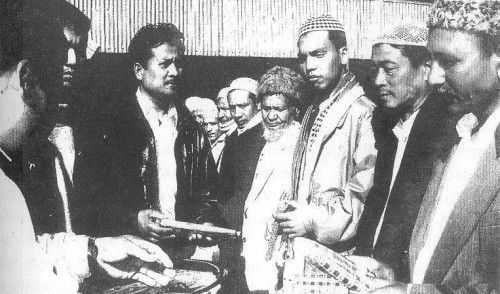 |
| Exchange of presents with love and happiness |
Id Festival - 'Id-Ul-Azha' & Id-Ul-Fitr
( Festival celebrated by the Meitei Pangal )
By: N Mangi Devi *
'ID-UL-AZHA', or The Feast Of Sacrifice
ID-UL-AZHA, or the Feast of sacrifice is called also yaum-un-Nahr, Qurban-i-Id, Qurban Bayram Baqr-i-Id ( the Cow Festival) and the Great Feast, and is held on the tenth day of the month Zul-Hijja. This festival has become part of the Meccan pilgrimage, of which it is the concluding scene. This feast, however, is the great Muhammadan festival, which is observed, wherever Islam exists.
There is a very remarkable Hadis, related by Ayesha, who states that Muhammad said " Man hath not done anything on the 'Id-ul-Azha' more pleasing to God than spilling blood; for verily the animal sacrificed will come, on the day of resurrection, with its horns, its hair, and its hoofs, and will make the scales of his (good) actions heavy.
Verily its blood reacheth the acceptance of God, before it falleth upon the ground, therefore be joyful in it. The animal sacrificed must be without blemish, and of full age; but it may be either a goat, a sheep, a cow, or a camel.
According to the commentator Jalal-ud-din Syuty, the sacrifice was instituted in commemoration of Ibrahim's willingness to sacrifice his son Ismail ! The following is the account given by Muhammadan writers :- "When Ibrahim (the peace of God be upon him) founded Mecca, the Lord desired him to prepare a feast for him. Upon Ibrahim's (the friend of (God) requesting to know what He would have on the occasion, the Lord replied, Offer up thy son Ismail.'
Agreeably tc God's command he took Ismail to the K'abato sacrifice him, and having laid him down, he made several ineffectual strokes on his throat with a knife, or. which Ismail observed, Your eyes being uncovered, it is through pity and compassion for me you allow the knife to miss : it would be better if you blindfolded yourself with the end of your turban and then sacrificed me'.
Ibrahim acted upon his son's suggestion and having repeated the words Bismillahi Allah Hoo Akhar (i. e., "in the name of the great God ') he drew the knife across his son's neck.
In the meanwhile, however, Gabriel had substituted a broad-tailed sheep for the youth Ismail, and Ibrahim unfolding his eyes observed, to his surprise, the sheep slain, and his son standing behind him. The sacrifice, as it is now performed on the 'Id-ul-Azha', is as follows :-The people assemble for prayer at the "Idgah as on the 'Id-ul-Fitr'; after prayers the people return'to their houses.
The head of the family then takes a sheep (or a cow or camel) to the entrance of his house and sacrifices it, by repeating the words, " In the name of the great God," and cutting- its throat. The flesh of the animal is then divided, two-thirds being kept by the family, and one-third being given to the poor in the name of God.
|